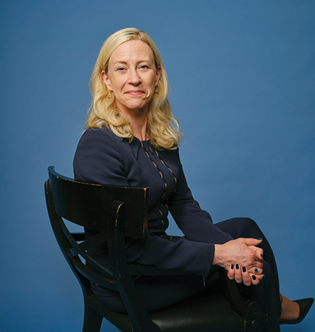
Chris Buck
The Yale Alumni Magazine publishes a short interview with President Maurie McInnis ’96PhD in every issue. In this one, the president talks about Yale College and budget issues with YAM acting editor Peggy Edersheim Kalb ’86.
View full image
YAM: You have talked about strengthening the undergraduate experience. Why this attention now and what are the issues you are seeing?
MM: The college is the oldest part of Yale, and it has for centuries stood for the value of a liberal education, where we help our students learn how to think, not what to think. But we can’t be static in that commitment, because our world is changing so rapidly.
I would point out the changes that AI is bringing, not only to our pedagogy, but to the world that our students are going to be entering; I would point out the very polarized political climate in which we find ourselves, and our desire to make sure we are able to create a diverse learning community that teaches our students to engage with one another across difficult topics, but to do so in a community of respect.
YAM: What steps are you taking to make those things happen?
MM: Pericles Lewis, the dean of Yale College, has been leading a big strategic look at Yale College. That is about everything that is happening curricularly, the ways we support our students outside the classroom, and the integration with the residential colleges, which are really the special sauce of a Yale College experience.
YAM: How do you see the residential college experience, specifically, evolving now?
MM: Well, I don’t know that I see it evolving exactly. I want to be sure that we are being attentive to its role in the undergraduate experience. We have noticed that since Covid, an increasing number of students are choosing to live off campus for their junior and senior years. We want to understand how that is changing the relationship between students and their college, both for those who move off campus and for those who are resident in the college. As a piece of that, Dean Lewis has made some changes in how room allotment works to respond to the housing needs of our rising juniors.
YAM: I’ve seen a lot lately about Career Services and life after Yale.
MM: I think it’s going to have to continue evolving quite rapidly because the array of jobs that will be out there is going to change more in the next 5 years than it has in the last 20 years. The way in which AI is changing a lot of those entry-level jobs is significant and by no means a static thing.
YAM: In your most recent letter to the community, you talked about the increase in the endowment tax and the dramatic cutbacks in federal grant money specifically for scientific research. What kind of impact do you expect those to have on the college?
MM: It is the $64,000 question, and not one for which we have full clarity yet. The one thing that we do know is that an 8 percent endowment tax has been levied on the institutions at our endowment level, and that will have a very significant impact on our budget. Yale’s overall budget is one-third funded by the endowment, but if you remove the medical school, the rest of the university is about two-thirds endowment-funded. So there will be a lot, over the course of this academic year, for each of the units to figure out about how they are going to be responsive to the endowment tax. We initiated a 90-day hiring pause, we announced a 5 percent reduction in all non-salary annual budgets, and we will spend time this year making some hard choices as the impact of the cuts becomes clearer.
Now that’s the endowment tax piece. The other budget piece relates to federal support for research that comes predominantly through the scientific agencies like NIH and NSF. We do not yet know what the impact on those budgets is going to be.
YAM: Is there anything else that you think alumni should be aware of?
MM: Just that we appreciate the work that so many of our alumni did last spring in contacting their lawmakers and in advocating for continued support for science and for higher education.
 loading
loading